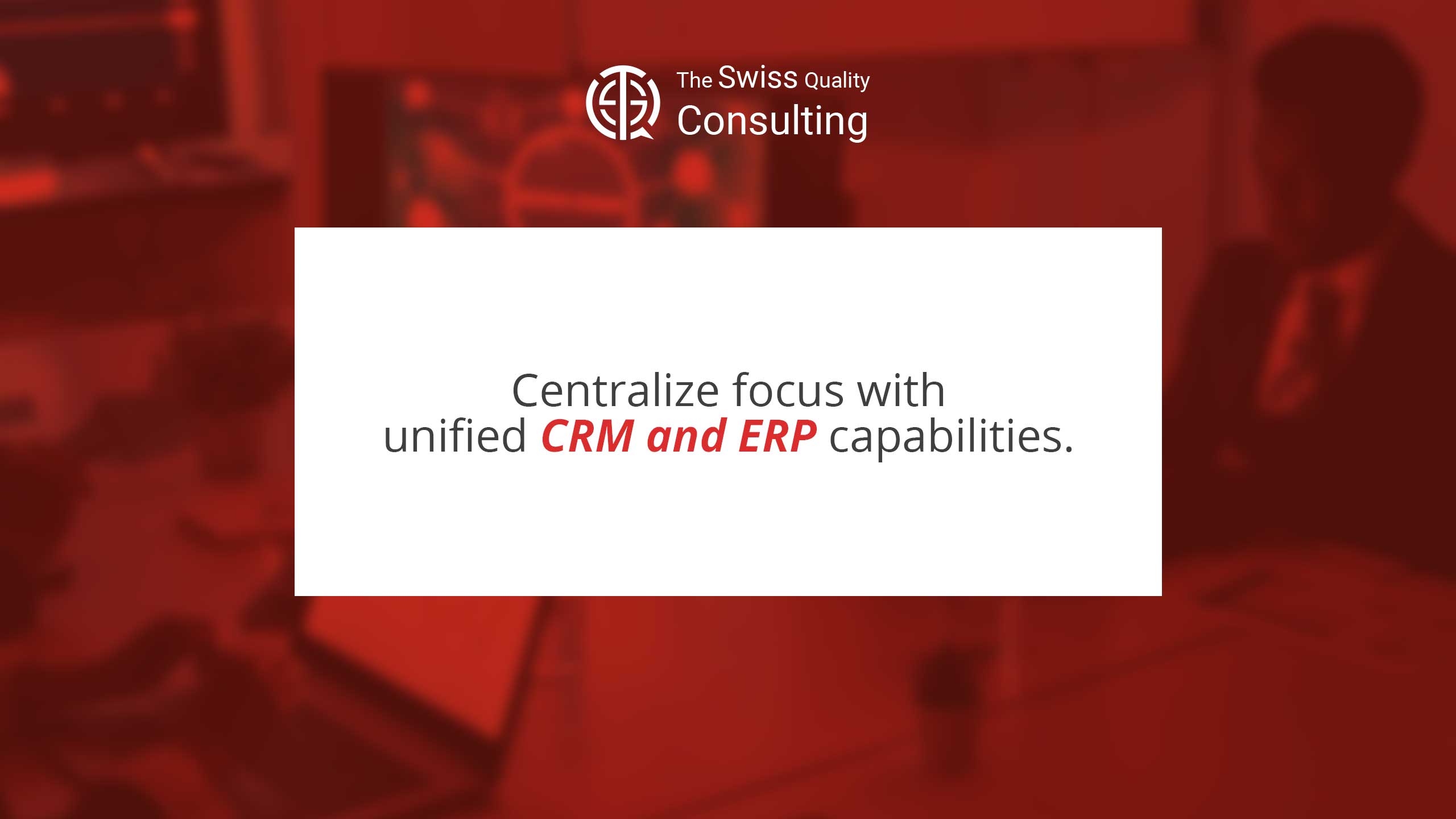Centralizing Focus with Unified CRM and ERP Capabilities: Enhancing Business Operations

Integrating CRM and ERP for Streamlined Management
Introduction
In today's complex business environment, centralizing focus with unified CRM and ERP capabilities is increasingly becoming a strategic imperative for organizations. This article is crafted for business executives, mid-level managers, and entrepreneurs who are seeking to understand the benefits and implementation of integrating Customer Relationship Management (CRM) and Enterprise Resource Planning (ERP) systems for enhanced business efficiency.
The Synergy of CRM and ERP Integration
In today's interconnected and customer-centric business environment, the integration of Customer Relationship Management (CRM) and Enterprise Resource Planning (ERP) systems has emerged as a cornerstone of operational excellence, seamlessly bridging the gap between customer interactions and back-office processes. This strategic synergy enables businesses to foster a unified view of their customers, streamline business operations, and achieve a holistic approach to managing the entire customer lifecycle.
Traditional business models often operated in silos, with CRM systems managing customer data and interactions, while ERP systems handled back-office processes such as inventory management, order fulfillment, and financial reporting. This fragmented approach created data discrepancies, hindered collaboration, and limited businesses' ability to gain a comprehensive understanding of their customers' needs and preferences.
The integration of CRM and ERP systems breaks down these silos, creating a unified platform that seamlessly connects customer data with operational processes. This integration empowers businesses to:
1. Enhance Customer Insights: By combining customer data from CRM systems with operational data from ERP systems, businesses gain a 360-degree view of their customers, encompassing their preferences, purchase history, interactions with various departments, and overall satisfaction levels.
2. Streamline Order Processing and Fulfillment: CRM data informs ERP systems about customer orders, preferences, and delivery requirements, enabling seamless order processing, accurate fulfillment, and timely delivery.
3. Improve Inventory Management: CRM data on customer demand trends and sales forecasts informs ERP systems' inventory management strategies, ensuring optimal stock levels, minimizing stockouts, and avoiding overstocking.
4. Enhance Customer Service: Real-time access to customer data across CRM and ERP systems empowers customer service representatives to provide personalized, informed, and efficient support, resolving issues promptly and enhancing customer satisfaction.
5. Optimize Marketing Campaigns: CRM data on customer behavior and preferences informs targeted marketing campaigns, ensuring that businesses reach the right customers with the right messaging at the right time.
6. Data-Driven Decision Making: The integration of CRM and ERP systems provides businesses with a unified source of data, enabling data-driven decision-making across all aspects of the organization, from customer acquisition to retention and growth.
In essence, the integration of CRM and ERP systems is not merely a technological advancement; it is a strategic transformation that empowers businesses to operate with greater efficiency, data accuracy, and customer-centricity. By bridging the gap between customer interactions and back-office processes, businesses can create a seamless customer experience, foster lasting customer relationships, and achieve sustainable growth in today's dynamic and competitive marketplace.
Streamlining Business Processes for Enhanced Productivity
Unified CRM and ERP capabilities allow businesses to streamline their processes, reducing redundancy and ensuring that all departments have access to the same, up-to-date information.
Role in Change Management
Implementing unified CRM and ERP systems is an essential component of change management. This shift requires a strategic overhaul of existing processes and systems, necessitating careful planning and execution.
Managing Organizational Change for Integration Success
Successful integration of CRM and ERP systems requires effective change management strategies, ensuring that all employees are aligned with the new system and understand its benefits.
Impact on Executive Coaching and Leadership
Leadership is crucial in the successful adoption of unified CRM and ERP capabilities. Executive coaching services now increasingly focus on training leaders in the nuances of managing integrated systems and leading digital transformations.
Equipping Leaders for Technological Advancements
Through executive coaching, leaders are prepared to drive the adoption of CRM and ERP integration, equipping them with the necessary skills to navigate the complexities of digital transformation.
Effective Communication in System Integration
Effective communication is key in the successful implementation of integrated CRM and ERP systems. It involves clearly conveying the benefits and changes brought by the integration to all stakeholders.
Facilitating a Unified Approach to System Adoption
Clear communication ensures that all departments understand the advantages of the integrated system, fostering a unified approach to its adoption and use.
Generative AI in Enhancing CRM and ERP Integration
Generative Artificial Intelligence (AI) can significantly enhance the functionality of CRM and ERP systems. AI-driven analytics provide deeper insights into customer behavior and business operations, enabling more informed decision-making.
Leveraging AI for Advanced Business Intelligence
The integration of generative AI in CRM and ERP systems offers advanced capabilities for business intelligence, leading to more strategic and data-driven decision-making.
Conclusion Centralizing Focus with Unified CRM and ERP Capabilities
In conclusion, centralizing focus with unified CRM and ERP capabilities is a strategic approach for businesses aiming to optimize their operations and customer relations. By integrating these systems and leveraging advanced technologies like AI, companies can achieve greater efficiency, data coherence, and customer engagement, ultimately driving business success.
#CRMandERPIntegration, #BusinessEfficiency, #DigitalTransformation, #AIinBusiness, #UnifiedSystems
https://bit.ly/3Qoe8mM
Comments
Post a Comment